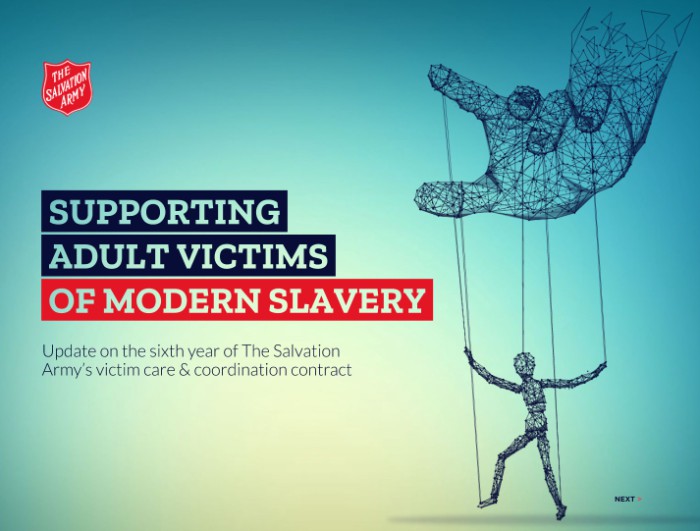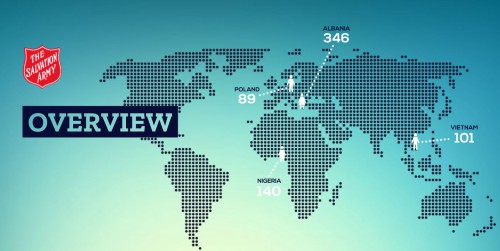New UK modern slavery findings
Modern slavery in the UK is on the increase according to a number of recent reports, writes Kira Taylor

New findings from The Salvation Army show an increase in the number of modern slavery victims being referred to them for support.
Its report provides an overview of the SA’s work since it began running the Government contract for victim support in 2011/2012. Over the six years, there has been a 300 per cent increase from 378 in 2011/2012 to 1,554 people 2016/2017.
According to the report, 48 per cent of victims are trafficked for sexual exploitation, 39 per cent for labour exploitation and 13 per cent for domestic servitude with one individual trafficked for organ removal. While almost half of victims were referred from London, other referrals were received from across England and Wales, showing it is a nationwide problem and that citizens need to look out for the signs.
The report also highlights the source countries, the number of which has doubled since 2011, now reaching 95. For the fourth year running, the highest number of female clients referred were from Albania, followed by Nigeria.
Vietnam, for the first time, is the source country of the highest number of referred male clients and is the second highest country for men and women combined.

Those findings follow another report earlier this autumn, looking into the trend of Vietnamese workers being exploited in nail bars and calling for a licensing scheme. The report, from independent anti-trafficking commissioner Kevin Hyland, found that some people worked from morning to evening, seven days a week for £30.
It recommended that a licensing scheme should be introduced to prevent trafficked Vietnamese migrants being employed in slavery-like conditions.
The number of people living in slavery in the UK is likely to be higher than the current estimate of 13,000, according to Mr Hyland.
Speaking to The Guardian following the the publication of his annual anti-slavery report in October, Mr Hyland said the true figure was likely to be in the tens of thousands.
However, he said there had been a real progress in tackling anti-slavery crimes, with an increase of 159 per cent in the number of modern slavery offences recorded across England and Wales last year.
Spotting modern slavery
To help people spot modern slavery, The Salvation Army has produced a new animation.
Anne Read, The Salvation Army’s Director of Anti Trafficking and Modern Slavery, said, 'We now need everyone in the UK to recognise the uncomfortable truth that modern slavery is taking place all around us. Everyone should make it their business to understand what to look for and who to tell.'
Mr Hyland also highlighted some of the ways to spot modern slavery. ‘Look at the venue, look at the conditions staff are working in, look at the costs. Ask: is it feasible to run those premises with those staff members and those prices? These things may stack up; you should contact the police, or the local authority, crimestoppers or the modern slavery helpline.’ (08000 121700)
Anne Read, The Salvation Army’s Director of Anti Trafficking and Modern Slavery, said, 'We now need everyone in the UK to recognise the uncomfortable truth that modern slavery is taking place all around us. Everyone should make it their business to understand what to look for and who to tell.'
Mr Hyland also highlighted some of the ways to spot modern slavery. ‘Look at the venue, look at the conditions staff are working in, look at the costs. Ask: is it feasible to run those premises with those staff members and those prices? These things may stack up; you should contact the police, or the local authority, crimestoppers or the modern slavery helpline.’ (08000 121700)
Trafficking stories
Included in the Salvation Army report are stories from some victims of modern slavery. One man from Poland was promised well-paid work in the UK, but when he arrived, found he was being forced to work in a number of different places without pay. He was threatened with violence against him and his family in Poland. After eight months, he managed to escape.
A second story is that of a woman from Albania, who met a man and struck up a relationship with him. He promised to take her out of her abusive relationship with her husband and kept her in his flat by drugging and intoxicating her. There, she was forced to sleep with the men who came. She was brought to Britain to face the same ordeal. She escaped and is now hoping to complete her nursing training.
The Salvation Army has projects in third world countries, such as recovery and skills training in places like Ghana and Malawi. Recent funding from the Modern Slavery Innovation Fund has allowed them to open projects in the Philippines and Nigeria, two places ranked highly on the list of source countries. In the UK itaims to provide the start of a journey to recovery through tailored support.
'The Salvation Army is in this fight for as long as it takes for the war to be won,' said Anne. 'We are strongly committed to working in partnership and believe that there is more to be achieved when we combine forces and collaborate in our efforts to prevent trafficking and protect its victims.'
A Baptist response
Baptist minister Dan Pratt, Antislavery Co-ordinator for the Eastern Baptist Association, attended the launch of the Clewer Initiative, the Church of England’s response to Modern Slavery.
In
a subsequent article for The Baptist Times, he made three actions points for Baptist churches – and asked how can we as Baptists develop a robust and collective response towards the injustice of modern slavery?
In 2018 the EBA along with The Clewer Initiative is facilitating three regional anti-slavery summits in Cambridge, Chelmsford and Norwich.
The European Baptist Federation has an anti-trafficking group looking to connect with Baptist circles and meet with church leaders to help educate people about modern slavery. To contact them, email
helle@ebf.org;
lauran@pobox.com.
Baptist Times, 08/11/2017